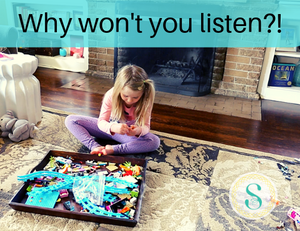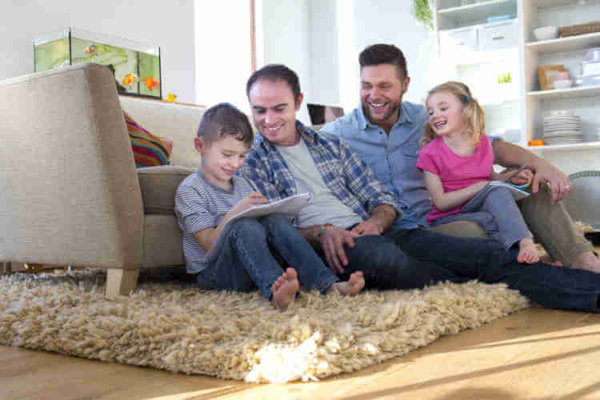My Kids Don’t Listen
Did you ever watch Family Feud? I loved that game show. They would give a category and contestants would guess what the top answers were. “Survey says…!” I play this game with myself when I teach parenting classes. I always start with having parents call out their child’s top behavioral challenges. In my head I guess which will be first. Within the top three, guaranteed every time, is “not listening.”
It is infuriating to parents that their kids “won’t listen” and they report they have “tried everything.” I offer the reframe that very likely they ARE listening. They have heard you, but what you really mean is they aren’t obeying. Ironically, when we make the next list, which is life skills you want for your children when they are 25, blindly obeying is nowhere on it. Nor is doing what you’re told without question, or being passively compliant. If you don’t want it when they are all grown up, then you don’t get to have it when they are little. It doesn’t magically disappear.
“Not obeying” then pushes an invisible button that triggers a usual pattern of adult behavior:
“They only listen when I yell.”

So what is really going on here? Are they disobeying? Being disrespectful? Ignoring? Being defiant? Or, are they lacking the skills to be able to, or missing the relational connection to WANT to? Have we really tried everything? Or just yelling?
Here are some alternatives to shift from making them obey to teaching them the skills they need to listen and cooperate:
Get into their world
Getting into our child’s world requires perspective-taking, a skill that very young children do not have yet. “Children tend to stick to their own viewpoint, rather than consider the view of others.” Even at 4 years old, children can’t see your perspective (i.e. that you’re running late) or other perspectives, generally. In the meantime, they need you to get into their world to choose a different response in order to change their behavior.
Are they swinging happily? Or deep in a book? Passionate about their rock collection? They truly live in an alternate universe, so just as if you were visiting another country, try getting into their culture. They will SEE you more because you have taken the time to visit them. Connect to what they are doing and THEN give your direction or request. It is the bridge that brings them back to reality. Positive Discipline calls this Connect before Correct, and Dr. Siegel describes this as connecting to the emotional right brain so you can lead them to their more rational left brain. I think it is just good social skills.
Developmental insight
Children are actually wired to get super into things and hyperfocus. Your voice is a whisper compared to their Lego tower or the ant crawling on the sidewalk. It isn’t because they have stayed up the night before dreaming up ways to drive you crazy. They are primarily visual learners (which you know by the way you see little ones imitate). When you can, physically walk over, make eye contact, and even touch them before giving your request. Better yet? Try a non-verbal signal, like the hand gesture I use when my daughter is using a baby voice (no it’s not the middle finger). Or simply point to what it is that needs to be done if it is clear, like putting the shoes or backpack away or wiping up a spill.
What is expected right now?
Half the time, our kids don’t know what they are supposed to be doing. We THINK they do, but again, the priorities in these two worlds we are living in are not the same. We end up nagging about getting ready, cleaning up their room, washing hands, and using potty talk, but we have never taken the time to TEACH the expectations. (Did you know the root of the word discipline actually means “to teach”?)
Is there a clear morning, afternoon, or evening routine? Is it visual? Is there consistency that they only play when their responsibilities are finished? What does it mean to clean the room? Clean as in you can evacuate in an emergency (child’s perspective) or clean as in you can eat off the floor (parent’s perspective)? When is that supposed to happen? Seriously. When? Once a day? After any game? On the weekends? And what does it mean to a preschooler to get ready for school?
Break down those steps, GET CLARITY and make it consistent.
Give them autonomy and control to create their routines and let them practice. Every day is a practice! Make decisions about what is expected and give them relevance about why. (Sorry, the old school “because I said so” just doesn’t cut it anymore. I think our society should move away from blind obedience to empowering our next generation, and so our family unit should reflect that.) The benefit of autonomy, relevance, and control is that it builds intrinsic motivation ( WANTING to comply). You get to become a leader that supports them to be their best selves, instead of a nagging manager.
Be solution focused instead of focused on consequences
Parents quickly threaten to take things away, count to ten, or just yell louder to “make them learn the lesson” but we know from the neurological research that our brains actually grow and learn when we feel safe and encouraged. Hmm. That sounds about right. Did you learn algebra by having your teacher give a threat and then count to 10?
Solutions are related, respectful, reasonable and HELPFUL.
For example, kids can be sooooooo slow sometimes. It’s because their executive functioning is not like ours (you are super efficient and focused 100% of the time, right?). It is still developing. A solution might be to teach them about planning and organizing and again, making it relevant. Let them be in charge of packing the snack for the park, or organizing their stuffed animals and then all the shoes in the closet. Instead of doing it for them or getting exasperated, hold firm and slice it thinner by going one step at a time and making it fun.
Mutual Respect
How do children learn to listen? They watch, they imitate. How do you listen to your child? Do you put your phone down and lock eyes? I recently had a parent tell me that she listens TOO much. Her kindergartener will go on and on and after 40 minutes she’s so bored she can’t even fake it anymore. This is where MUTUAL respect comes in. Have some respect for yourself too. Teach your kiddo the signs of social communication: how to pause and ask questions or allow someone else to get a word in, and what the natural flow of a conversation looks and sounds like. “Listening” is a pretty socially complicated skill and deserves to be taught explicitly. We all know a LOT of adults who never got the lesson.
What about safety?
This is at the core of not listening, and often why we freak out for the small infractions. If they won’t listen to me at home, what happens when they run across the street? This is why it helps to save the yelling for the big stuff. Of course, if they are running across the street you are going to save their life any way you can. But when you get to the other side, what will help next time? Think about a meeting you are about to lead, or soccer playoffs, or a big test. What do you do? You prepare and practice, and then right before you are about to start, you give yourself a little pep talk with the top reminders. Safety is the same way. Prepare them with practice, and then remind them right before. “We are in a parking lot so when we get out of the car we are going to hold hands until we get to the store.” Every. Single. Time. Until they are old enough to say “Mom, I got it, can I borrow the car?” they will still need the preparation and practice.
Not listening will always be in the top 3 challenges in parenting classes, because we are human beings and so are our children. Communication is at the core of all interpersonal relationships. We will never be perfect and neither will our children. But when WE listen, connect with intention, and set up systems and routines that invite autonomy and control, we at least have a fighting chance at one day, actually being heard.





Comments